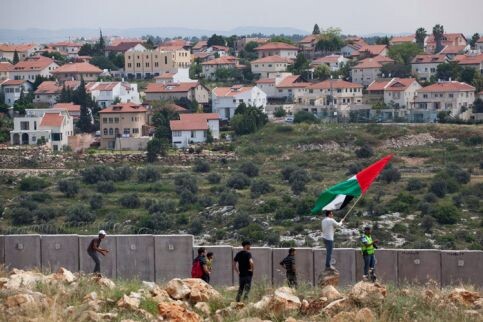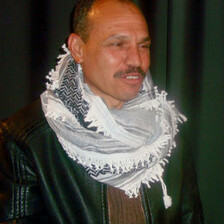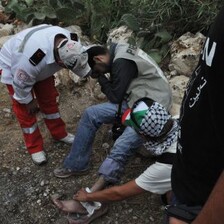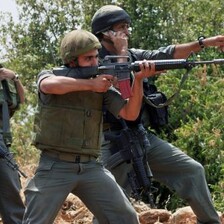The Electronic Intifada 30 August 2010

Protesters near Israel’s wall in Nilin; an Israeli settlement sits in the background. (ActiveStills)
When Israel’s construction of the wall began in their village May 2008, the people of the occupied West Bank town of Nilin embarked on a campaign of unarmed grassroots resistance against the theft of their land. They have followed a philosophy of direct action, cutting through the electronic fence and razor wire on an almost weekly basis until Israel added 20-foot-high concrete slabs to the barrier, which protesters managed to topple. The people of Nilin have paid a high price for their struggle for their rights — five villagers were killed in the first year of protest — and they have shown no signs of stopping. Jody McIntyre interviewed Mohammed Amireh, a leader of the Nilin Popular Committee Against the Wall and Settlements for The Electronic Intifada.
Mohammed Abdulkader Amireh:I have four children, two sons and two daughters. Both of my sons were born with a skin condition for which there is no medical treatment, but can only be relieved with an olive oil ointment. I have lost all my land to the wall and settlements behind Nilin. This wall has stolen almost all of the land from the farmers of Nilin: we have lost 2,700 olive trees, 3,000 dunams [a dunam is the equivalent of 1,000 square meters] of land, and five of our brothers who have been martyred during our demonstrations against the wall. We have suffered hundreds of injuries from live ammunition and rubber-coated steel bullets, and many pregnant woman have lost their unborn babies due to tear gas canisters that soldiers have thrown inside their homes. One hundred and sixty-seven people have been imprisoned for their participation in the demonstrations against the w all, 11 of whom remain in jail today. Twenty-nine people have been shot with a special 0.22 caliber live bullet, which is designed to do maximum damage after entering the body, and many of them are still suffering from their injuries because the bullets are still in their bodies. Many houses in the village have suffered fire damage from tear-gas being shot into the home and setting alight. But we will never give up, and we must continue in our struggle for peace and justice for Palestinians and for all people in the world.
I have been injured many times; once a rubber-coated steel bullet entered the hand I was using to protect my face. I have also been beaten by the Israeli soldiers on numerous occasions.
I have been arrested four times, the first time I was imprisoned for a few months, the second time for eight days, and the last two times for one day each. I remember one of the last times one of the Israeli commanders was threatening to keep me for another eight days. I told him that it didn’t matter if he kept me for eight days, eight weeks or eight years … it would not stop me from protesting against the theft of my land. Suddenly he got a call from one of his colleagues, and ordered me to be released immediately; I wasn’t yet aware that Ahmed Mousa, a ten-year-old boy from the village, had just become our first martyr in the struggle against the wall. I work as a teacher at a local school, and the friends of Ahmed now miss him dearly … they don’t know why he was killed. There wasn’t even a demonstration taking place at the time of his death!
I remember in one of his classes at school, Ahmed drew a picture of two flags, a Palestinian flag and an Israeli flag because he was hoping there would be peace, but he didn’t know that just ten minutes later there would be a live bullet waiting to enter his skull.
All of the people in Nilin are now directly suffering from the wall and settlements that have been built on our land. I, as a farmer, cannot reach my land, and the 25 sheep and goats I owned in the past had to be sold off, as I had nowhere to feed them. Most people from Nilin were farmers, so now that we have lost our land the rate of unemployment here has dramatically increased.
We have chosen the path of nonviolent resistance, but the Israeli army continues to use every weapon against us. We hope that our struggle will be finished soon, and that the occupation will be ended.
Jody McIntyre: What was life like in Nilin before the wall was built?
MA: Most people in Nilin were farmers or agricultural workers; we used our land to not only provide food for our families and children, but also for our animals, our sheep, goats, horses and donkeys. So it was a quiet life. The problems with the settlers began once they started attacking people from the village and expropriating our land.
JM: How did the popular resistance first begin in Nilin?
MA: The first demonstration was a spontaneous one. On 17 May 2008, when the Israeli army came to our land accompanied with bulldozers, it came as a big shock to us. All the farmers went to their land simply to stop the bulldozers. In that first demonstration, the army arrested Firas Amireh, a resident of the village who was married with three children, and we were forced to pay 1,500 NIS ($400) for his release.
From then on we continued the demonstrations on a daily basis, choosing the path of nonviolent resistance as we felt it was the shortest route to reaching the world, to let our voices be heard and to show that we are Palestinian civilians, and not violent terrorists as the Israeli media likes to portray. We believed that nonviolent resistance would touch people’s hearts more than violence, and if we want to remove suffering from the world we must take some of that suffering on our shoulders. After all, peace will only bring peace, and terror will only bring terror. We need peace and justice not only in Palestine, but across the world, if we are to succeed in this struggle.
JM: How has your day-to-day life changed because of the occupation and the wall that has been built here?
MA: Well, I work as teacher, and here the schools finish early, at about 12:30pm, so in the afternoons I have free time. In the past, I would go to my land all the time; I was growing wheat, vegetables and olives, and my sheep and goats produced milk and cheese. Now I have no place to go and work together with my wife. In some other parts of Palestine, the Israeli soldiers occasionally grant permits for farmers to visit their land, but no one from my family has ever been allowed, not even to harvest our olive oil, or to remove the weeds from around our olive trees.
The Israeli army even tried to place the village under curfew to kill the popular resistance here — on 7 July 2008, we were under curfew for four days, with only two hours per day to buy food — but it didn’t work, everyone was out in the streets demonstrating and building makeshift roadblocks to restrict the army’s movement. I walked out into the street with my small son in my arms, to show them that they couldn’t break our spirit. People were coming with cars full of food and supplies to break the curfew from villages across the district … it was a great show of solidarity.
JM: In your work as a teacher, what have you seen as the effect of the occupation on the children of Nilin?
MA: Their minds have changed. Before the wall was built, you had children like Ahmed Mousa drawing Palestinian and Israeli flags together. Now, when we have our drawing class, all of the children are drawing Israeli soldiers attacking homes, throwing tear gas, and martyrs wrapped in Palestinian flags.
I remember the second boy that was killed … Yousef Ahmad Amireh. He was only 17 years old at the time. His grandmother called and told him that she really missed him, so he wanted to go and visit her … her house is just 200 meters behind mine. But when he got to my house, he saw that there were soldiers at the entrance of the village shooting tear gas and live bullets, and young guys throwing stones back at them. I told him that he could get to his grandmother’s house through the fields instead of taking the main road, but he told me that he was too afraid that a soldier might see him and shoot him, so he stood with me at the front entrance of my home, and we watched as the clashes between soldiers and youth ensued on the main street. All of a sudden, an Israeli army jeep pulled up directly in front of us, and a soldier jumped out and shot a live bullet … I hadn’t even noticed that Yousef, standing right beside me, had been hit, but when I turned I saw the blood pouring from his face …
Children that once believed in peace, after seeing the brutal actions of their enemy, don’t believe in peace anymore. But as a teacher, I tell the children that we must have hope, that the dark of the occupation will fall, and in the morning the sun of peace and justice will shine on Palestine. If it’s not today, maybe it will be tomorrow, or in one month, or even in one year, but we must always have hope.
JM: Can you tell me about Road 446?
MA: Road 446 was built by the Israeli government in 1992, and it was decided that the village of Nilin would be split into two sides. Many of us have brothers or sisters living in the other side of the village, and a lot of the time we can’t reach them, either because we are under curfew or because the army have set up a flying checkpoint at the entrance of the village, and are making problems for any cars trying to enter or leave. Sometimes it feels as if our family members are living in a different village! Another problem is the dangerous nature of such a busy highway running through a small village like ours, making it impossible for children to walk from one side of the village to the other. Instead, their families must pay for buses to take their children to school, or taxis to take them to the house of a family member living on the other side of Nilin. Not to mention the land that was confiscated and the olive trees that were uprooted to make way for Road 446.
The road leads to the huge settlement of Modiin Illit, so its purpose is clear, but when the road was established we were told that is was a normal road like any other, for the use of Israelis and Palestinians. Now we are not allowed to travel south on Road 446, only towards the north, but who knows if we will retain even this right in the future. It has become an apartheid road. In the past we have heard about plans to build an underground tunnel for Palestinians, but we don’t know if this is true or not. Nevertheless, we hope that the settlements will be removed from our land, the occupation will be ended, and thus the road will be handed over for the use of Palestinian civilians.
JM: Who from Nilin is currently in prison?
MA: Ibrahim Amireh is a 43-year-old man with eight children, some of whom are studying at university … now, it’s difficult for them to pay for the food, let alone their education. This is the third time Ibrahim has been imprisoned. Like me, he has lost all of his land behind the wall. The army once tried to occupy his house early in the morning, to prevent his family from reaching the demonstration, and injured one of his small daughters in the process. Another of his daughters was shot with live ammunition while standing inside the window of their family’s home. Hassan Mousa is another resident of Nilin currently in jail; an English teacher at the local school, he had studied in his youth in India, and was imprisoned by the Israelis purely for the reason that he is generally the person who speaks to international supporters who come to support us, because of his good grasp of the English language. The court decided that both Hassan and Ibrahim would stay in prison for one year, and would pay 9,000 NIS ($2,383) each to be released.
The Israeli army got their confessions against Hassan and Ibrahim by kidnapping young men from the village and subjecting them to torture and interrogation. Amongst the claims in the confessions were that they throw stones at the demonstrations, and give money to encourage others to do the same. Both of these claims are completely false. These men have always followed the philosophy of nonviolent resistance, always directed their thoughts towards keeping the demonstrations peaceful, and have barely enough money to support their own families, let alone to support others.
There are nine others still in prison, including Saddam Nafer, Ahmed Nafer, Mostafa Amireh, Said Amireh, Ibrahim Srour and several other young guys.
JM: Tell me about the current Friday demonstrations against the wall.
MA: Every time we try to reach the gate that the Israeli soldiers have built in front of the concrete wall. Sometimes we carry a message for the soldiers, to tell them that this land belongs to simple farmers, and that if they are really an army wishing to defend their country then they can go back to their borders as stipulated by the United Nations in 1967. Just let us return to our land. We have families, you have families … we don’t need any more suffering.
JM: How have the demonstrations changed now from when they began two years ago?
MA: In the past we were having four or five demonstrations per week, but now we only have one or occasionally two. People have been killed at the demonstrations, and this makes many more afraid to attend. Many young guys simply can’t afford to go to prison for a second or third time. Some have been injured … the Palestinian Authority might help their families finance their medical treatment, but no one can heal the psychological wounds. Many people see that the Israeli army have built a fence, and afterwards a huge concrete wall in front of that, and feel that now the wall is complete it is pointless to continue. The Israeli army uses many different tactics and forms of punishment to stop Palestinians from returning to their land. Some, like me, still have hope that if we continue our peaceful demonstrations, maybe, just maybe we can reach out to the people of the world, end this occupation and return to our land.
JM: You said that the Israeli army built a fence and a concrete wall, and that both are now finished. So how do you retain hope?
MA: In winter, some places in the world become dark for several days, weeks or even months. But once the winter is over, the sun always shines again. We must focus on the positives, not the negatives. Throughout history, many regimes have imposed brutal occupations on foreign peoples, but they have always been overcome. This occupation will be no different.
Jody McIntyre is a journalist from the United Kingdom. He writes a blog entitled Life on Wheels which can be found at jodymcintyre.wordpress.com. He can be reached at jody [dot] mcintyre [at] gmail [dot] com.





